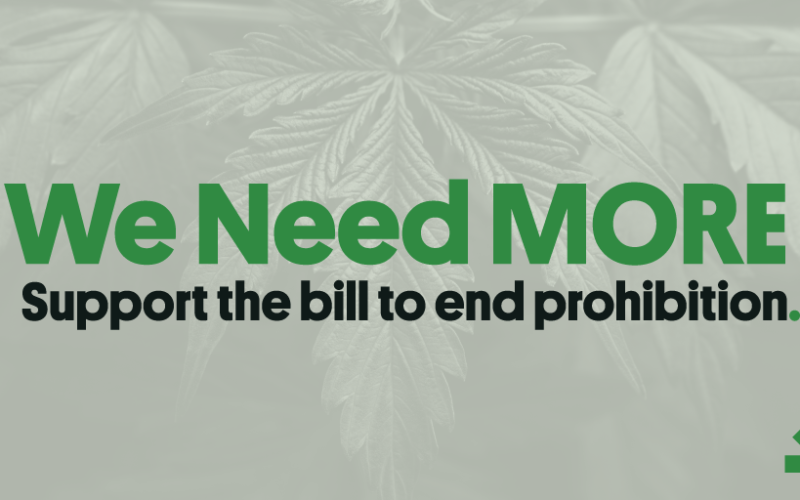[ad_1]
Washington, DC: Today, House Judiciary Committee Chairman Jerry Nadler, along with Cannabis Caucus co-Chairs Earl Blumenauer and Barbara Lee, Judiciary Crime Subcommittee Chairwoman Sheila Jackson Lee, House Democratic Caucus Chairman Hakeem Jeffries, and Small Business Committee Chairwoman Nydia Velázquez introduced the Marijuana Opportunity, Reinvestment, and Expungement Act of 2021, better known as The MORE Act. The Act repeals the long-standing federal prohibition of marijuana — thereby ending the existing state/federal conflict in cannabis policies and providing state governments with greater authority to regulate marijuana-related activities.
You can tell your Representative to support and cosponsor the bill quickly here.
“When the MORE Act was approved by the House of Representatives in the previous session, Congress demonstrated in no uncertain terms that the days of federal marijuana prohibition are numbered,” said NORML Political Director Justin Strekal. “While Senate Majority Leader Schumer and Senators Booker and Wyden continue to solicit feedback for their forthcoming legislation in the Upper Chamber, the House is preparing to once again advance criminal justice-focused legislation that will bring our failed prohibitionist policies to an end while also ensuring that those Americans who are saddled with the consequences of a marijuana conviction can have their records cleared.”
“Since I introduced the MORE Act last Congress, numerous states across the nation, including my home state of New York, have moved to legalize marijuana. Our federal laws must keep up with this pace,” said House Judiciary Committee Chairman Nadler. “I’m proud to reintroduce the MORE Act to decriminalize marijuana at the federal level, remove the needless burden of marijuana convictions on so many Americans, and invest in communities that have been disproportionately harmed by the War on Drugs. I want to thank my colleagues, Representatives Barbara Lee and Earl Blumenauer, Co-Chairs of the Congressional Cannabis Caucus, as well Representatives Sheila Jackson Lee, Hakeem Jeffries, and Nydia Velázquez for their contributions to this legislation, and I look forward to our continued partnership as we work to get this legislation signed into law.”
“Last year, we saw more progress toward cannabis legalization than ever before. This has been driven by unprecedented reforms at the state level. Now, Congress must deal with the problems created by the failed federal policy of prohibition,” said Rep. Earl Blumenauer, founder and co-chair of the Congressional Cannabis Caucus. “With a strong base of support in the House and in the Senate, the table is set. It’s past time that we stop federal interference with cannabis banking and research, as well as the terrible pattern of selective enforcement that has devastated communities of color. The MORE Act will help address all of these problems and more.”
“During the last year, people across the country have seen how injustice impacts communities of color—from police brutality to the COVID-19 pandemic. The War on Drugs is no exception. We must deliver justice to those most impacted by America’s racist and discriminatory cannabis laws,” said Rep. Lee, co-chair of the Congressional Cannabis Caucus. “I’m proud to be working alongside Chairman Nadler and Congressional Cannabis Caucus co-chair, Congressman Blumenauer, to reintroduce the MORE Act, which includes my bill to bring restorative justice to communities of color impacted most—the Marijuana Justice Act. The MORE Act will not only put an end to harmful federal cannabis policies that have ruined countless lives, it will seek to reverse the damage by providing true equity and opportunity for those looking to access this booming industry. We are on our way toward true justice.”
Tell your lawmaker to support and cosponsor The MORE Act
Context:
On Friday, December 4th, Members of the House of Representatives voted to approve the MORE Act of 2020, HR 3884, by a margin of 228-164. Yet under the leadership of then-Majority Leader Mitch McConnell, the full Senate did not consider the legislation prior to the close of the 116th congressional session.
In the previous Congress, the MORE Act was carried in the House by Judiciary Committee Chairman Jerry Nadler and in the Senate by Vice President Kamala Harris. Since the new Congress convened in January of 2021, Senate Majority Leader Schumer, along with Finance Committee Chairman Ron Wyden and Judiciary Committee’s Senator Cory Booker have announced their intention to introduce their own version of a comprehensive cannabis reform legislation that would build upon the criminal justice provisions of the MORE Act.
The MORE Act provisions would remove marijuana from the federal Controlled Substances Act — thereby eliminating the existing conflict between state and federal marijuana laws and providing states with the authority to be the primary arbiters of cannabis policy within their own jurisdictions.
FURTHER: The MORE Act would also make several other important changes to federal marijuana policy, including:
- Facilitating the expungement of low-level, federal marijuana convictions, and incentivizing state and local governments to take similar actions;
- Creating pathways for ownership opportunities in the emerging regulated industry as well as other sectors of the economy for local and diversely-reflective entrepreneurs who have been impacted under prohibition through the Small Business Administration grant eligibility;
- Allowing veterans, for the first time, to obtain medical cannabis recommendations from their VA doctors;
- Removing the threat of deportation for immigrants accused of minor marijuana infractions or who are gainfully employed in the state-legal cannabis industry;
- Providing critical reinvestment grant opportunities for communities that have suffered disproportionate rates of marijuana-related enforcement actions.
Key Facts Underscoring Marijuana Policy Reform Efforts:
- According to the FBI UCR, over 545,000 Americans were arrested for marijuana-related crimes in 2019 alone, over 90% of those arrested were charged with mere possession.
- According to a recent report by the ACLU, Black Americans are 3.6 times more likely to be arrested for cannabis-related crimes than white Americans.
- The state-legal cannabis industry employs over 321,000 full-time workers; that is over six times the number of jobs specific to the coal industry.
- While the substance is not without harm, cannabis is objectively less harmful than legal and regulated alcohol and tobacco.
[ad_2]
Source link
Medical Disclaimer:
The information provided in these blog posts is intended for general informational and educational purposes only. It is not a substitute for professional medical advice, diagnosis, or treatment. Always seek the advice of your physician or other qualified healthcare provider with any questions you may have regarding a medical condition. The use of any information provided in these blog posts is solely at your own risk. The authors and the website do not recommend or endorse any specific products, treatments, or procedures mentioned. Reliance on any information in these blog posts is solely at your own discretion.







